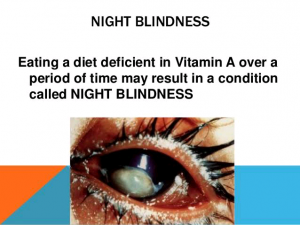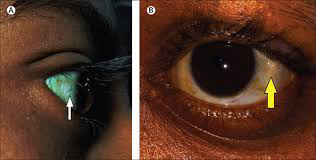Night blindness is a decrease in the ability to see in reduced illumination. It is usually seen in patients with underlying eye problem such as in patients with impaired rod function. It is often associated with Vitamin A deficiency. Although the term “night blindness” implies total loss of vision, this is usually not the case. Night vision is often impaired but not totally lost.
CAUSES OF NIGHT BLINDNESS
Night blindness can be caused by various reasons some of which include;
Short sightedness (Myopia)
Glaucoma (Increased intraocular pressure)
Cataracts (Opacity of the ocular lens)
Vitamin A deficiency
Diabetic eye disease (Diabetic retinopathy)
Pigmentary retinopathy
Usher syndrome

SYMPTOMS OF NIGHT BLINDNESS
The main symptom of night blindness is difficulty to see in the dark and also in dim light.
Difficulty in adapting to the dark from bright areas.
Excessive squinting at night.
HOW TO PREVENT NIGHT BLINDNESS
Night blindness can be prevented by;
Eating foods rich in vitamin A such as; spinach, milk, egg, collard greens, carrots, cantaloupes, mangoes, pumpkins, sweet potatoes e. t. c
Going for regular eye check-ups.
Putting on sun glasses to reduce the risk of glaucoma.
Adequate sugar control in Diabetes.
Note: Night blindness as a result of usher syndrome cannot be prevented because it is a congenital defect.
WHO IS MORE LIKELY TO HAVE NIGHT BLINDNESS
Older adults
People with pancreatic insufficiency
People with diabetes
TREATMENT OF NIGHT BLINDNESS
Treatment depends on the cause
Vitamin A supplementation in Vitamin A deficiency
Night blindness caused by shortsightedness can be corrected using corrective lenses
Cataracts can be removed surgically
Night blinded individuals should refrain from driving at night until they are treated.
REFERENCES
https://my.clevelandclinic.org
https://www.healthline.com/health/vision-night-blindness

Gbenga Ogunbayode is currently a medical student of Olabisi Onabanjo University, Ogun State, Nigeria. He has earned a certificate of achievement for COVID-19 : Psychological First Aid in Africa from Public Health England and London school of hygiene and tropical medicine. He is a reader, aspiring researcher, lover of music and enthusiastic about knowing more.

